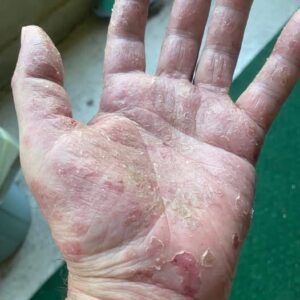These are the signs that he is critical about seeking medical help and should consult a doctor immediately. These are the signs that he is experiencing a skin condition such as a fungal infection or eczema and should see a healthcare professional for proper diagnosis and treatment.
Understanding Eczema: Causes, Symptoms, and Effective Management
Eczema, also known as atopic dermatitis, is a chronic skin condition that affects millions of people worldwide. Characterized by inflammation, redness, itching, and dryness, eczema can appear anywhere on the body, but it commonly affects the hands, face, elbows, and knees. While it can occur at any age, it often begins in childhood and may persist into adulthood. Understanding eczema, its triggers, and management strategies is crucial for improving quality of life for those affected.
The exact cause of eczema remains unknown, but research suggests that it is linked to a combination of genetic, environmental, and immune system factors. Individuals with a family history of eczema, asthma, or hay fever are at higher risk. The skin of those with eczema often lacks certain proteins and lipids that help maintain its barrier function, making it more susceptible to irritants, allergens, and infections. This compromised barrier can lead to excessive water loss, leaving the skin dry, sensitive, and inflamed.
Symptoms of eczema can vary widely among individuals. The most common signs include intense itching, redness, swelling, and rough or scaly patches. In some cases, small blisters may form, which can ooze and crust over if scratched. Chronic scratching can worsen the condition, leading to thickened, leathery skin—a phenomenon known as lichenification. Emotional stress and sleep disturbances are also common, as persistent itching can interfere with daily activities and overall well-being.
Several environmental factors can trigger or exacerbate eczema flare-ups. Common triggers include harsh soaps, detergents, perfumes, changes in weather, and exposure to allergens such as dust mites, pollen, or pet dander. Certain foods, such as dairy or gluten, may also worsen symptoms in some individuals, though this varies widely. Identifying personal triggers is essential for effective management, as avoiding or minimizing exposure can significantly reduce flare-ups.
Management of eczema involves a combination of skincare routines, medical treatments, and lifestyle modifications. Moisturizing regularly is one of the most important steps, as it helps restore the skin’s barrier and prevent dryness. Topical corticosteroids and calcineurin inhibitors may be prescribed to reduce inflammation during flare-ups, while antihistamines can help control severe itching. In more persistent or severe cases, phototherapy or systemic medications may be recommended under medical supervision.
Lifestyle changes can also play a significant role in managing eczema. Wearing soft, breathable clothing, avoiding long hot showers, and using gentle, fragrance-free cleansers can reduce irritation. Stress management techniques, such as mindfulness or yoga, may help prevent flare-ups, as emotional stress is a known trigger. Maintaining a balanced diet and staying hydrated can also support overall skin health.
Although eczema is a chronic condition with no known cure, many people can manage it effectively and lead a normal, healthy life. Early diagnosis, consistent skincare, and awareness of triggers are key to reducing the frequency and severity of flare-ups. Support from healthcare providers, family, and patient communities can also provide emotional reassurance and practical advice.
In conclusion, eczema is a complex skin disorder that affects both physical and emotional well-being. Understanding its causes, recognizing symptoms, and implementing effective management strategies are essential for improving quality of life. With proper care, individuals with eczema can minimize flare-ups, reduce discomfort, and maintain healthy, resilient skin. Awareness, prevention, and proactive treatment remain the cornerstones of living well with eczema.





